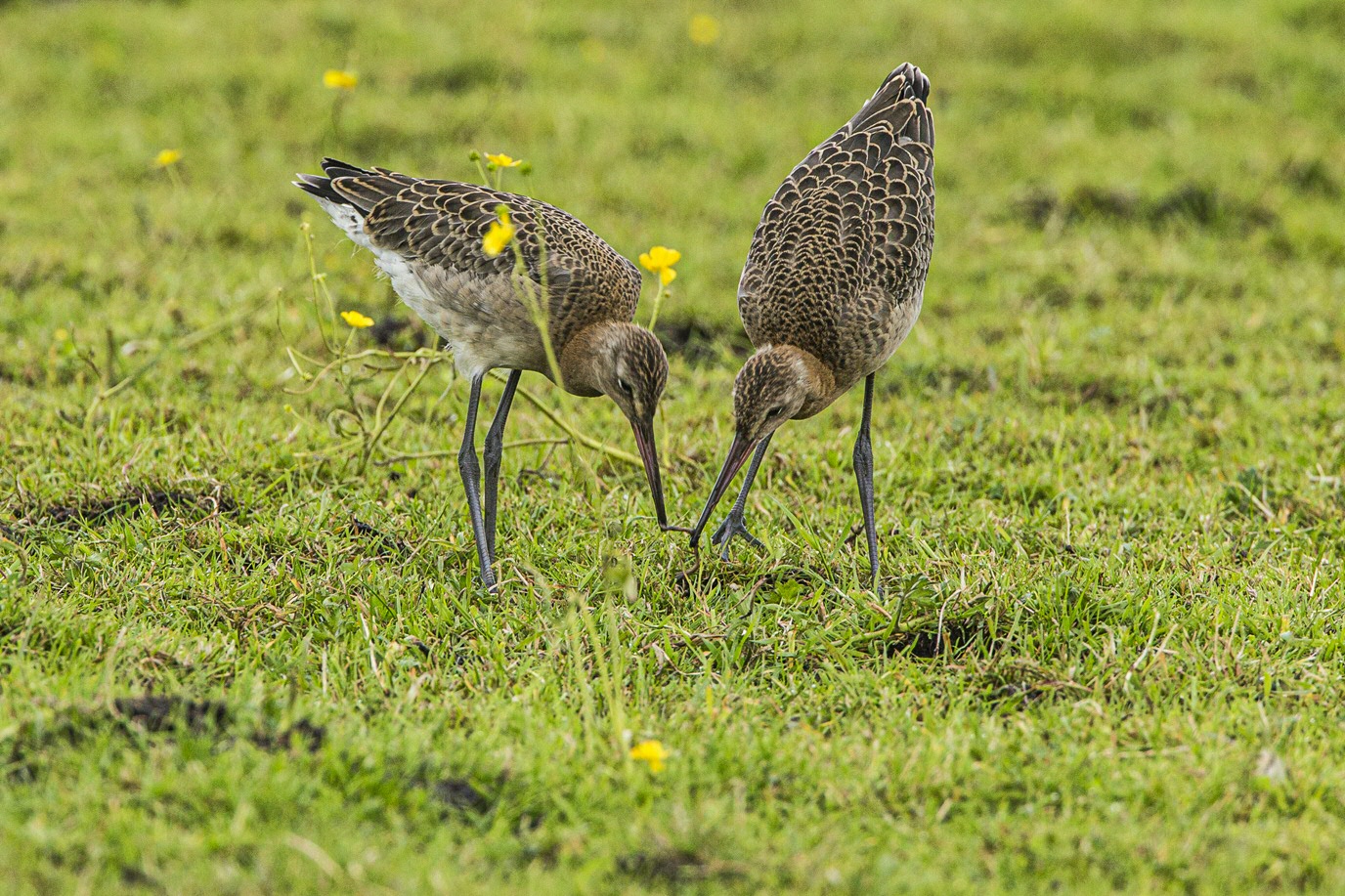Grutto’s gaan ‘naar school’
Grutto’s die in West-Europa uit het ei kruipen en in Zuid-Europa en Afrika overwinteren, leren de trekroute waarschijnlijk van soortgenoten. De routekaart zit dus niet in hun genen ingebakken. Dat is een van de conclusies uit het proefschrift waar Jelle Loonstra en Mo Verhoeven op 18 december - gezamenlijk! - op promoveren aan de Rijksuniversiteit Groningen.
Om te ontdekken hoe jonge grutto’s hun trekroute bepalen, lieten de onderzoekers een groep Friese grutto’s in gevangenschap uit het ei komen en opgroeien. Een deel van die vogels lieten zij aan het begin van het trekseizoen los in het gebied waar hun eieren waren gelegd, een ander deel brachten ze naar Polen, waar ook grutto’s broeden.

‘Naar school’
De verhuisde 'Friese' vogels bleken vervolgens vanuit Polen de trekroutes richting Afrika aan te houden die ook de volwassen Poolse vogels gebruiken, terwijl de Nederlandse vogels de route aanhielden die ook de andere Nederlandse vogels nemen. “Grutto’s gaan dus blijkbaar ‘naar school’. Ze leren waarschijnlijk van hun soortgenoten maar misschien ook wel van de rest van de omgeving,” verduidelijkt onderzoeker Jelle Loonstra.
Plaatstrouw
Jelle Loonstra en Mo Verhoeven onderzochten zowel kuikens als volgroeide vogels met behulp van zendertjes. Kuikens kregen minuscule zendertjes op hun donsveren geplakt, die vervolgens met een antenne konden worden gepeild om hun gebruik van het landschap en de overleving te bepalen. Volgroeide vogels kregen iets grotere zenders mee, die via satellieten over de hele wereld te volgen waren. Op die manier konden de trekroutes worden bepaald en konden de onderzoekers ook kijken hoe plaatstrouw de vogels in het broedseizoen en in hun winterkwartier waren. Dat laatste bleek in hoge mate het geval. Vogels keerden van jaar op jaar steeds naar dezelfde plekken terug.
Teloorgang
Verhoeven en Loonstra deden hun onderzoek in Zuidwest-Friesland, waar (door andere onderzoekers) ook de oorzaken van de teloorgang van weidevogels worden onderzocht. “Met ons onderzoek maken wij de biologische puzzel rond de grutto weer een klein beetje completer. Zo hebben wij bijvoorbeeld ook gekeken naar de verschillen in de overleving van mannetjes en vrouwtjes van de grutto,” vertelt Mo Verhoeven.
Beschermen weidevogels
Verhoeven vervolgt: “Als je deze en andere weidevogels beter wilt beschermen, zal je dat soort informatie rond de ‘demografie’ en dus ook rond het trekgedrag van de vogels moeten begrijpen. Ons onderzoek leert bovendien dat je bij het bestuderen van een soort echt bij dag 0 van het leven moet beginnen. Alleen dan kun je ook de verschillen later in het leven begrijpen.” “Dit onderzoek draagt ook in directe zin bij aan het beschermen van weidevogels”, denkt Loonstra. “Beschermen begint met kennen en ook met fascinatie. Weten hoe de trek van deze vogels werkt, draagt absoluut bij aan de fascinatie voor weidevogels!”
Nadere informatie
-
Het onderzoek voor het proefschrift van Mo Verhoeven en Jelle Loonstra werd mogelijk gemaakt door de Spinozapremie die NWO in 2014 toekende aan hoogleraar Theunis Piersma, met extra bijdragen van private donors.
-
Titel gezamenlijk proefschrift: On the Behaviour and Ecology of the Black-tailed Godwit; promotoren prof.dr. T. Piersma en prof.dr.ir. C. Both.
Meer nieuws
-
17 februari 2026
De lange zoektocht naar nieuwe fysica
-
10 februari 2026
Waarom slechts een klein aantal planeten geschikt is voor leven
